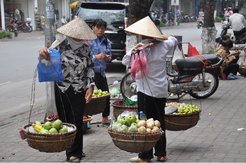Peasants or Peddlers? Mobile Street Vendors in Hanoi, Vietnam
Since Vietnam’s doi moi economic reforms were implemented in the late 1980s, petty trading activities have reappeared and now flourish, gaining increasing visibility on the nation’s town and city streets. Today, mobile street vendors have become an integral feature of the cityscape of the national capital, Hanoi. In recent years, however, state discourses about the “modernization” (hien dai hoa) and “civilization” (van minh) of the urbanizing capital have resulted in various bans on the activities of these itinerant vendors who are increasingly becoming associated with notions of backwardness and underdevelopment.
In light of these significant processes, in my field research I will analyze how key actors including global investors, national policy makers, and local officials participate in managing and responding to mobile street vendors in Hanoi. Thus, I focus in particular on the daily encounters and experiences of mobile street vendors with representatives of the state.
Besides an ethnographic account of vendor’s trading activities, I will also scrutinize aspects of belonging and social stratification: How do mobile street vendors perceive themselves in the context of rural-urban migration, economic opportunity and state policies? What is their position in a social hierarchy that is characterized by increasing inequalities? Furthermore, I want to conceptualize mobile street vendors as a distinct socioeconomic group with its own dynamics and features, instead of seeing them as part of a larger entity such as the so-called informal sector, the urban poor or as micro-entrepreneurs. My research will thus add to the study of street vending by contributing an ethnographic example that challenges dichotomies like formal – informal, urban – rural, and state – society.

